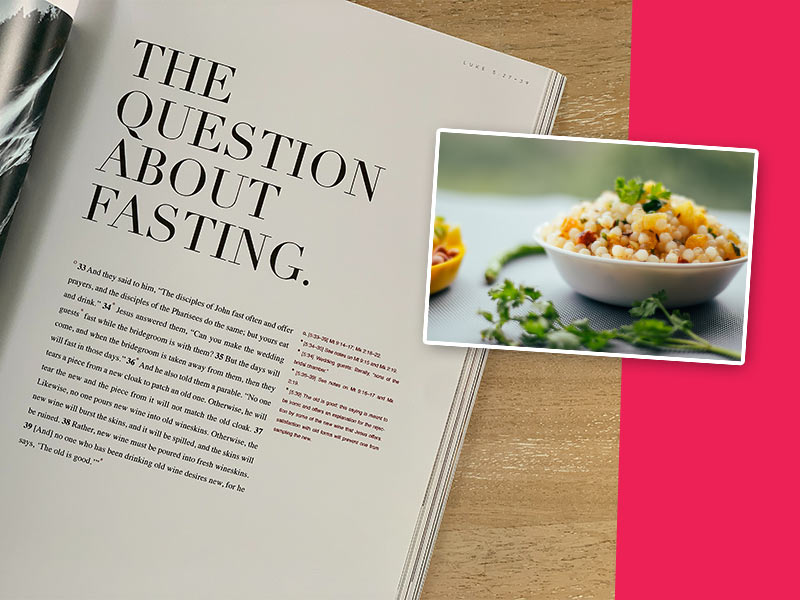
Fasting during the monsoon season in India is common. Many people fast throughout ‘Shraavana’, which is a month in the Hindu calendar, connected to the southwest monsoon season. A number of festivals fall in this period, during which people fast. According to Sreemathy Venkatraman, Clinical Dietitian & Wellness nutritionist and founder of ‘Mithaahara - Eat to live’, fasting during monsoons has been practised for ages as seasonal changes affect our digestion. Food that is heavy is difficult to digest and monsoon is the season of viral infections and diseases caused by mosquitoes, hence it is ideal to eat light and easily digestible foods for overall health and immunity.
Table of Content:-

(Photo Credit: Unsplash)
To know more about fasting, what to eat, what to avoid, how often one should fast and its overall health benefits, Onlymyhealth spoke to Clinical Dietitian & Wellness nutritionist Sreemathy Venkatraman. “Periodic fasts or cyclic fasts are well tolerated and better for health,” according to her. For example, fasting weekly or once in a fortnight. This lets our digestive system rest and “gives it a chance to self-clean or detoxify or what is called autophagy,” which comes from two words, ‘auto’ that means self and ‘phagy’ meaning eat. Hence, it is our body’s way of cleaning damaged cells, to generate new and healthy cells.
The Right Way To Fast
In India, it is common for those fasting to eat in one part of the day and refrain the same in the other. Solids and full meals are avoided. For example, they have fruits and warm fluids in one part of the day and have a light meal, such as poha, in the other. Cereal-based dishes such as pongal or khichdi are also eaten. The right way to fast depends on person-to-person and their underlying health issues. A diabetic person has blood sugar issues. Some also get headaches or migraines when fasting. Hence, it should depend on that person.
What You Should Eat When Fasting?
When fasting, it is recommended to drink warm fluids like porridge, milk, malt, soup and end the fast with a light one-dish meal like khichdi, poha, pongal or sabudana. Such foods are high in carbohydrates and are easy to digest, the nutritionist said.
Also Read: Planning To Water Fast? First Read Water Fasting Benefits and Side-Effects
What You Should Avoid When Fasting

(Photo Credit: Unsplash)
In India, it is often seen that people refrain from eating in one part of the day and indulge in heavy, fried foods such as puris and pakoras in the other. When you fast, both your digestion and metabolism slows down, hence it’s advised to break the fast with a light one-dish meal that is rich in carbs. Avoid oily foods and those that are difficult to digest, as they might cause heaviness, bloating and lethargy. Also, do not drink multiple cups of tea or coffee as it results in dehydration and acidity. Instead, drink tender coconut water, milk, thin porridges, and soups to keep you hydrated and energetic and not drained off, tired and irritable.
A Generic Diet Plan For Fasting
Here is a diet plan recommended by Sreemathy Venkatraman:
- After you wake up: Have a cup of tea, or coffee, whatever you are used to. Or have a cup of green tea.
- 9 am: Mixed cereal porridge with milk and jaggery
- 12 noon: Clear vegetable or clear dal soup. You shouldn’t consume too much fiber when fasting, hence clear soup.
- 2 pm: Tender coconut water. It is rich in electrolytes and better than glucose water.
- 4 pm: Green tea with honey
Break the fast in the evening and try to do it by 7 pm.
- 7 pm: Poha/ sabudana khichdi / moong dal khichdi / pongal. You can also have moong dal porridge with milk and jaggery.
Also read: 6 Accurate Ways To Ace Intermittent Fasting For Maximum Results

(Photo Credit: Unsplash)
Fasting tips to keep in mind
- There are certain tips you should keep in mind when fasting:
- Do not have smoothies when fasting as they’re rich in fiber and we want to keep the stomach as light as possible.
- Buttermilk is avoided as it is rich in probiotics, which should be avoided when the stomach is trying to detoxify.
- Have warm fluids instead of fruit juices. This is because juices contain fructose and often we add sugar to it. When fasting, try to avoid sugar altogether or keep its consumption to a minimum.
- You can have tender coconut water twice a day. It is rich in electrolytes and hydrates you well.
Health benefits of fasting

“Fasting has become a ‘Wellness Trend’ like Yoga,” says Sreemathy Venkatraman. Excellent for gut health and digestion, fasting serves as a protective mechanism to eliminate pathogens. A complete therapeutic process, it cleanses the body of toxins. It is also believed to slow down ageing and increase longevity.
Also read: Intermittent Fasting for Postpartum Weight Loss, Learn How Divya Harjai Is Doing It
Practised in Indian culture since time immemorial, fasting has amazing mental health benefits as well. According to the nutritionist, it improves mood, decreases pain sensation and decreases symptoms of depression. It also prevents brain fog and makes you more focused and energetic.
(With inputs from Sreemathy Venkatraman, Clinical Dietitian & Wellness nutritionist and founder of ‘Mithaahara - Eat to live’)
Read more articles on Healthy Diet
Photo Credit: Unsplash
Also watch this video
How we keep this article up to date:
We work with experts and keep a close eye on the latest in health and wellness. Whenever there is a new research or helpful information, we update our articles with accurate and useful advice.
Current Version